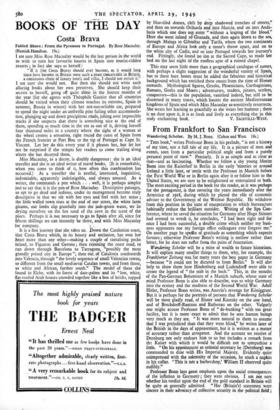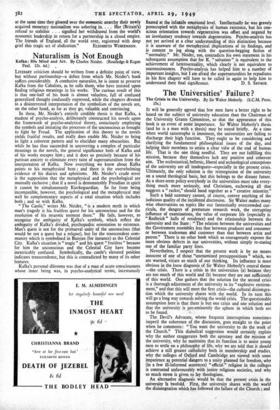From Frankfort to San Francisco
Wandering Scholar. By M. J. Bonn. (Cohen and West. 18s.)
" Tuts book," writes Professor Bonn in his prelude, "is not a history of my time, nor a full tale of my life. It is a picture of men and events, seen from a particular political angle and from a purely personal point of view." Precisely. It is as simple and as clear as that—and as fascinating. Whether we follow a shy young Moritz Bonn into the Kaiserhof in Berlin in the early 'nineties or around Ireland a little later, or 'settle with the Professor in Munich before the First World War or in Berlin again after it or follow him to the United States, we are sure to be enlightened or entertained or both. The most exciting period in the book for the reader, as it was perhaps for the protagonist, is that covering the years immediately after the Armistice of 1918, during which he played the role of economic adviser to the Government of the Weimar Republic. He withdrew from this position in the-state of exasperation to which bureaucrats habitually reduce the brilliant outsider. Writing of the Spa Con- ference, where he saved the situation for Germany after Hugo Stinnes had seemed to wreck it, he concludes, " I had been right and for once I had been successful, a double crime which neither my busi- ness opponents nor my foreign office colleagues ever forgave me." On another page he spelks of gratitude as something which expects favours ; otherwise Professor Bonn's writing is mellow rather than bitter, for he does not suffer front the pains of frustration.
Wandering Scholar will be a mine of wealth to future historians. It will explain many smaller things to them, why, for example, the Frankfurter Zeitung was for many years the best paper in Germany —because "it could not be dictated to from Berlin." It will also help to show them how Hindenburg and Ludendorff were able to create the legend of " the stab in the back." This, in the mouths of the Pan-German Bohemians of a Munich suburb, whose state of mind Professor Bonn is also able to describe, was to whip Germany into the ecstasy and the madness of the Second World War. Adolf Hitler, Professor Bonn writes, was Austria's revenge for Koniggratz. But it is perhaps for the portraits of persons that Wandering Scholar will be most gladly read, of Eisner and Kautsky on the one hand, and of Brockdorff-Rantzau and Rathenau on the other. Vulgarly one might accuse Professor Bonn of " de-bunking " with too great facility, but it is more exact to admit that he sees human beings very much as they are. " It was more natural to them to assume that I was prejudiced than that they were blind," he writes later of the British in the days of appeasement, but it is written as a matter of accuracy rather than arrogance. And the account we receive of Dernburg not only endears him to us but includes a remark from tilt Kaiser with which it would be difficult not to sympathise a little. " On his appointment as colonial secretary he (Dernburg) was commanded to dine with His Imperial Majesty. Evidently quite unimpressed with the solemnity of the occasion, he stuck a napkin in his collar. This is not a barbershop,' William II observed quite audibly."
Professor Bonn lays great emphasis upon the social consequences of the inflation in Germany ; they were obvious. I am not sure whether his verdict upon"the end of the gold standard in Britain will be quite as generally admitted. " Her (Britain's) statesmen were sincere in their advocacy of collective security in the political field ;
at the same time they gloated over the economic anarchy their newly acquired monetary nationalism was ushering in. . . . Her (Britain's) refusal to stabilise . . . signified her withdrawal from the world's economic leadership in return for a partnership in a closed empire. The friends of England, all the world over, registered with deep grief this tragic act of abdication." ELIZABETH WISKEMANN.



































 Previous page
Previous page